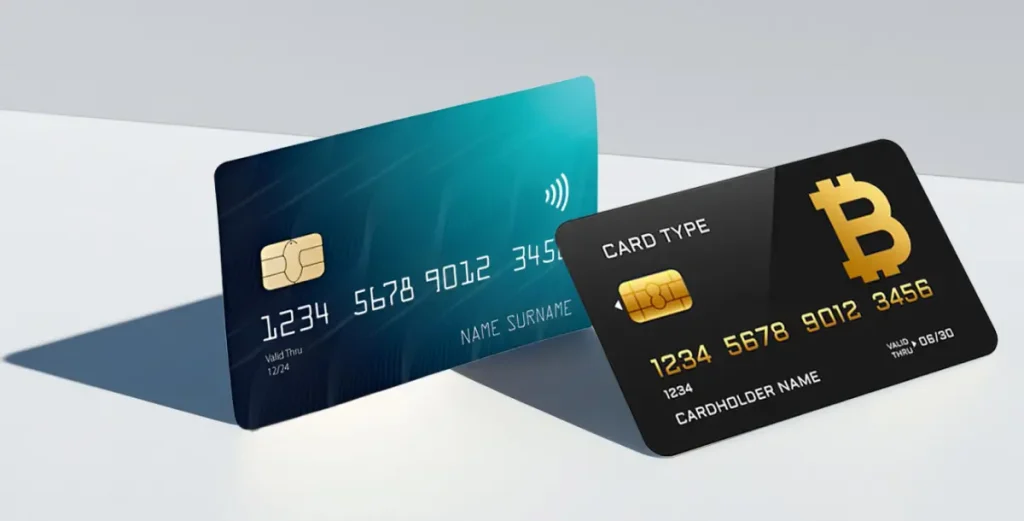The digital payments landscape continues evolving as businesses seek new ways to integrate cryptocurrency into their operations. For B2B organizations considering crypto payment solutions, understanding the distinction between crypto credit cards and crypto debit cards becomes crucial for making informed infrastructure decisions.
Both card types enable crypto transactions, but they serve fundamentally different purposes and operate through distinct mechanisms. While crypto debit cards facilitate direct crypto spending by converting digital assets to fiat at the point of sale, crypto credit cards function as traditional credit instruments that reward users with cryptocurrency.
For businesses evaluating crypto payment integration, this crypto debit card vs. crypto credit card comparison will clarify how each option works, their respective benefits, and which solution aligns best with your organization’s financial strategy and customer needs.
What Is a Crypto Debit Card?
A crypto debit card connects directly to a user’s cryptocurrency wallet or exchange balance, enabling real-time conversion of digital assets to fiat currency during transactions. When a customer makes a purchase, the card automatically converts the required crypto amount into the merchant’s preferred fiat currency at current market rates. Think of it as spending what you own.
How Crypto Debit Cards Work
The transaction flow operates seamlessly: crypto holdings are converted to fiat currency at checkout, allowing merchants to receive traditional payment while customers spend their digital assets. This process typically takes seconds and requires no additional infrastructure changes for businesses already accepting standard debit cards.
Key Benefits for Business Integration
Crypto debit cards offer several advantages for organizations considering crypto payment adoption:
- Instant liquidity: No waiting periods for crypto-to-fiat conversion
- Global accessibility: Works anywhere traditional debit cards are accepted
- Reduced complexity: Minimal technical integration required
- Direct asset utilization: Customers spend actual crypto holdings
This solution appeals particularly to businesses serving crypto-native customers who prefer spending their digital assets directly rather than maintaining separate fiat accounts.
What Is a Crypto Credit Card?
Crypto credit cards function identically to traditional credit cards, extending fiat-based credit lines to users. The key distinguishing feature lies in their rewards structure: instead of traditional cashback or points, these cards distribute cryptocurrency rewards based on spending activity. Think of it as earning crypto while spending fiat.
The Fiat-to-Crypto Model
Users make purchases using borrowed fiat currency and receive crypto rewards deposited into designated wallets. The card issuer handles all cryptocurrency transactions on the backend, purchasing digital assets and distributing them as rewards. Monthly payments remain in fiat currency, following standard credit card terms.
Rewards and Incentive Structures
Crypto credit cards typically offer competitive rewards programs, often providing higher cryptocurrency cashback rates than traditional cards offer in fiat rewards. Common reward structures include:
- Bitcoin cashback: 1-4% back in BTC on all purchases
- Multi-token rewards: Earnings in various cryptocurrencies
- Stablecoin options: USDC or USDT for price stability
- Bonus categories: Enhanced rewards for specific spending types (e.g., dining, travel)
These cards attract businesses whose employees or customers want to accumulate cryptocurrency while maintaining traditional, credit-based spending patterns.
Crypto Credit Card vs. Crypto Debit Card: Side-by-Side Comparison
| Feature | Crypto Debit Card | Crypto Credit Card |
| Funding Source | User’s crypto wallet/exchange balance | Traditional fiat credit line |
| Payment Method | Instantly converts crypto to fiat for payment | Uses borrowed fiat, earns crypto rewards |
| Credit Requirements | Generally none required | Standard credit check mandatory |
| Debt Potential | No borrowing involved | Standard credit card debt risk |
| Rewards Structure | Often limited or tiered crypto rewards | Substantial crypto cashback/rewards |
| Target Users | Crypto holders wanting to spend | Credit users wanting to earn crypto passively |
| Business Integration | Standard POS compatibility | Standard credit processing |
| Volatility Exposure | Direct crypto price impact on purchase value | Minimal crypto price exposure during purchase |
Advantages and Considerations of Each Card Type
Crypto Debit Card Benefits
Operational Simplicity: Crypto debit cards require no additional merchant infrastructure beyond existing debit card processing capabilities. Businesses can immediately serve crypto-holding customers without technical modifications.
Zero Credit Risk: Since transactions draw from existing crypto balances, there’s no lending risk or credit approval process. This streamlines customer onboarding and reduces administrative overhead.
Real-Time Conversion: Instant crypto-to-fiat conversion ensures merchants receive immediate payment without exposure to cryptocurrency volatility.
Potential Drawbacks: Conversion fees may apply on each transaction, potentially impacting customer satisfaction. Additionally, limited rewards programs compared to crypto credit cards may reduce customer incentives. Spending crypto is often considered a taxable event, a key consideration for users.
Crypto Credit Card Advantages
Customer Acquisition Tool: Attractive crypto rewards programs can draw new crypto-curious customers, particularly those interested in building cryptocurrency portfolios through everyday spending.
Preserved Liquidity: Customers maintain their crypto holdings while earning additional digital assets through rewards, appealing to long-term crypto investors.
Enhanced Purchase Protection: Traditional credit card benefits like fraud protection and dispute resolution provide additional security layers.
Considerations: Credit approval requirements may exclude some potential customers. Additionally, the lending nature introduces traditional credit risks that businesses must evaluate when partnering with crypto credit card providers.
Which Solution Fits Your Business Needs?
The choice between supporting crypto debit or credit cards depends on your organization’s customer base, risk tolerance, and strategic objectives.
Choose Crypto Debit Cards If:
- Your customers actively hold and want to spend cryptocurrency
- You prefer solutions with minimal technical integration requirements
- Direct crypto-to-fiat conversion aligns with your payment processing needs
- You want to avoid credit-related compliance considerations
Choose Crypto Credit Cards If:
- Your customer base values rewards and loyalty programs
- You want to attract crypto-curious customers who don’t currently hold digital assets
- Traditional credit card processing already forms part of your payment infrastructure
- You’re comfortable with credit-based customer relationships
Many businesses find success implementing both options, allowing customers to choose their preferred crypto payment method while maximizing market reach.
Implementing Crypto Payment Solutions
For businesses ready to integrate crypto payments, partnering with established infrastructure providers simplifies the implementation process. ChainUp’s white label crypto payment card solution enables businesses to offer debit cards without managing the underlying blockchain technology directly.
Platforms like ours handle the complex technical requirements—from blockchain integration to regulatory compliance—while businesses focus on serving customers and growing their operations. The result is a seamless crypto payment experience that bridges traditional finance with digital asset innovation.
Choosing Your Crypto Payment Strategy
Both crypto debit and credit cards serve distinct roles in the evolving digital payment ecosystem. Crypto debit cards excel at enabling direct cryptocurrency spending, while crypto credit cards focus on cryptocurrency accumulation through traditional spending patterns.
For businesses considering crypto payment integration, the decision often comes down to customer preferences and business objectives. Organizations serving crypto-native audiences may prioritize debit card solutions, while those targeting mainstream consumers might emphasize credit card rewards programs.
The most successful implementations often include both options, providing flexibility that meets diverse customer needs while positioning businesses at the forefront of payment innovation. As cryptocurrency adoption continues expanding across B2B markets, having robust crypto payment infrastructure becomes increasingly valuable for maintaining competitive advantage.
Ready to explore how crypto payment solutions can benefit your business? ChainUp’s comprehensive infrastructure makes it simple to offer crypto debit card capabilities, giving your organization the flexibility to serve customers however they prefer to engage with digital assets.




